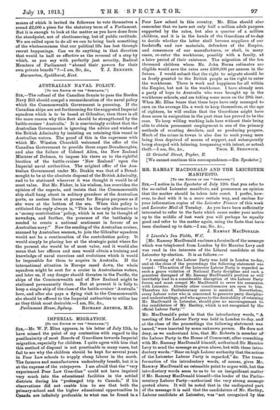IMPERIAL MIGRATION.
[To THE EDITOR Or THE "Sraczeroa.”3 SIR,—Mr. W. P. Elias appears, in his letter of July 12th, to have missed the point of my contention with regard to the pusillanimity of most Boards of Guardians towards Imperial migration, especially for children. I quite agree with him that this method of disposal is not practicable in many cases, but fail to see why the children should be kept for several years in Poor Law schools to Supply, cheap labour in the north. The farmers and manufacturers undoubtedly benefit, but it is at the expense of the ratepayers. I am afraid that the "very experienced Poor Law Guardian" could not have inquired very much into the educational facilities in the settled districts during his "prolonged trip to Canada," if his observations did not enable him to see that both the primary-school and the higher educational opportunities in Canada are infinitely preferable, to what can be found in a Poor Law school in this .country. Mr. Elias should also, remember that we have not only half a million adult paupers. supported by the rates, but also a quarter of a million. children, and it is in the hands of the Guardians of to-day to decide whether the latter shall become suppliers of our foodstuff's and raw materials, defenders of the. Empire, and consumers of our manufactures, or shall, in many cases,- re-enter the workhouse, possibly with a family, at. a later period of their existence. The migration of the ten thousand children whom Mr. John Burns estimates are eligible would save the rates over £300,000 per annum in the- future. I would submit that the right to migrate should bo- as freely granted to the British people as the right to enter the workhouse. There is work and happiness for all within the Empire, but not in the workhouse. I have already sent a party of boys to Australia who were brought up in the workhouse schools, and am taking some more on the 29th inst. When Mr. Elias hears that these boys have only managed to. earn on the average lls. a week to keep themselves, at the age of eighteen, he will realize that the Guardians might have done more in emigration in the past than has proved to be the- case. To keep willing working lads here without their being. able to obtain permanent employment is one of the primary methods of creating derelicts, and so producing paupers.. Much of the crime in towns is also due to such young men being thus deprived of means of support, and subsequently being charged with loitering, trespassing with intent, or actual.
theft.—I am, Sir, &c., Taos. E. SEDGWICII. 33 Oriental Street, Poplar, E.
[We cannot continue this correspondence.—En. Spectator.)










































 Previous page
Previous page